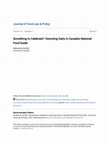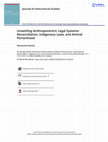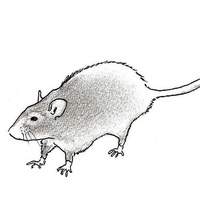Papers by Maneesha Deckha

Psychology of Human-Animal Intergroup Relations
Legal systems across the world classify animals as property. There is growing global momentum ask... more Legal systems across the world classify animals as property. There is growing global momentum asking courts in anthropocentric legal systems to revisit this position through test-case litigation. This has resulted in a few discrete victories for animals, but not much more. An ongoing issue is general legal conservatism and the belief in human exceptionalism that judges exhibit in these and related cases. In addition to general human exceptionalism, this article argues that a further psychological block for judges can arise from concerns about exacerbating racism and other intra-human prejudices given histories and legacies of animalizing and dehumanizing certain human groups. The first aim of this study is to illustrate this psychological phenomenon impacting judicial decision-making in relation to race. The article discusses the 2022 decision by the New York Court of Appeals with respect to the ongoing captivity of Happy, an elephant at the Bronx Zoo. This decision is selected give...
As do most areas of critical literature, cultural studies usually takes the human subject as a gi... more As do most areas of critical literature, cultural studies usually takes the human subject as a given. Recently, however, calls to enrich the field through non-anthropocentric inquiry that extends beyond humanist parameters have become more frequent. These calls find a robust response in two recent anthologies: Animal Subjects: An Ethical Reader in a Posthuman World, edited by Jodey Castricano; and Bits of Life: Feminism at the Intersections of Media, Bioscience, and Technology, edited by Anneke Smelik and Nina Lykke. Both texts take cultural studies as their primary organizing anchor, taking care to highlight and appreciate the interdisciplinarity of the field and its relationship to feminist studies in excavating ideas and valuations of difference, alterity, and abject status
Carceral Logics
This chapter explores how human children soften the abusive edge of carceral spaces. Prisons, imm... more This chapter explores how human children soften the abusive edge of carceral spaces. Prisons, immigration detention centres, and zoos and aquaria are institutions that attract sustained public scrutiny from prisoner rights, migrant rights, anti-racist, and animal rights movements. Critics and scholars note the entwined nature of race, gender, and species logics that shape and unite these spaces and object to the shortand long-term incarceration these institutions make possible as well as the conditions residents confined within experience. 1 Prisoner rights, migrant rights, and animal rights critics also contest the messaging that these institutions and their proponents use to assure the public of the need for confinement and the ethical acceptability of the conditions captive animals and humans experience. 2 These 1
Social Science Research Network, Oct 10, 2018
<jats:p>None.</jats:p>

In early 2019, the Canadian Government released the muchanticipated new Canada Food Guide. It is ... more In early 2019, the Canadian Government released the muchanticipated new Canada Food Guide. It is a food guide that deemphasizes dairy products and promotes plant-based eating. Notably, in the new version, milk and milk products are de-listed as one of the previously four essential food groups. On the surface, it seems that the federal government is promoting veganism and helping to bring about a friendlier future for animals and humans harmed by being producers and consumers of dairy, as the new Guide may seriously contract the currently robust Canadian dairy industry and its powerful lobby. On closer inspection, the messaging from Health Canada is easily overtaken by an administrative landscape that protects the dairy industry and markets dairy products to Canadians and abroad as well as a legal landscape that completely commodifies cows. Adopting a critical animal studies perspective, this paper situates Health Canada's de-listing of dairy as a nutritionally foundational food source within a larger socio-legal Canadian regulatory landscape to assess the potential of the new Canada Food Guide to contest the entrenched legal and cultural norm of the dairy cow and her milk as products for human consumption.

The Palgrave Macmillan Animal Ethics Series, 2017
This chapter interrogates the view that animals fare better in white, Western dominant liberal cu... more This chapter interrogates the view that animals fare better in white, Western dominant liberal culture than non-Western (invariably racialized) cultures. To counter the literature that assumes that multiculturalism is bad for animals, this chapter considers why multiculturalism is good for animals and argues that we should abandon the quick association between minoritized cultural practices and animal suffering (which is not meant to suggest that minoritized cultures are safe havens for animals). This chapter points to the misrepresentation of non-Western/colonized cultures as comparatively regressive for animals through a comparative analysis of one cultural arena: legal texts and reform. The analysis highlights the entrenched anthropocentrism of liberal legal systems as well as animal-friendly contemporary legal developments in the global South.

Journal of Human Rights and the Environment, 2020
Plant-based diets are often perceived as being antithetical to Indigenous interests in what is to... more Plant-based diets are often perceived as being antithetical to Indigenous interests in what is today colonially known as Canada. This perceived antithesis hinges on veganism's rejection of the consumption of animals. This apparent antithesis, however, is a misperception that a reframing of ethical veganism can help correct. This article argues that veganism's objection to dairy should be underscored as a central concern of ethical veganism. Such emphasis not only brings into view the substantial alignment between plant-based diets and Indigenous worldviews, but also highlights the related goals of decolonization and reconciliation in Canada. Veganism, in reality, rejects a practice (dairy farming) that was constitutive of settler colonialism in North America and which still promotes colonial familial ideologies while constructing Indigenous peoples and other non-Europeans (who disproportionately cannot tolerate lactose) as abnormal. Veganism – along with vegetarianism – shar...

Journal of Intercultural Studies, 2020
This paper argues that interspecies justice is integral to rising decolonizing nationalist 'recon... more This paper argues that interspecies justice is integral to rising decolonizing nationalist 'reconciliation' efforts in Canada and that such an interspecies perspective on reconciliation carries a significant promise for developing a new legal subjectivity for animals in settler colonial law to change the conditions of the lives of animals materially. I demonstrate that the personhood ascribed to animals in numerous Indigenous legal orders in Canada, as well as underlying non-anthropocentric worldviews where animals are not considered inferior to humans but are to be regarded as kin, should stimulate a new legal conversation in Canadian law about who/what animals are and the legal subjectivity and regard they merit among all those committed to reconciliation. Indigenous legal orders offer animal advocates a new and potentially transformative legal argument as to why the continued legal classification of animals as a property in Canadian law is exploitative and incompatible with a dominant legal order seeking to foster genuine reconciliation. Notwithstanding the residual anthropocentric elements of Indigenous worldviews promoting 'respectful' or 'reciprocal' relations with animals, and how such elements might be co-opted by settler society, this new reconciliation-originating animal-friendly argument has the potential, if adopted, to alter the material conditions of lives of many animals, most notably in intensive agriculture.

Revista Brasileira de Direito Animal, 2014
Este ensaio desafia as fronteiras hegemônicas humanistas do<br />Direito ao analisar ... more Este ensaio desafia as fronteiras hegemônicas humanistas do<br />Direito ao analisar os desafios envolvidos em padronizar disciplinas<br />pós-humanistas nos currículos dos cursos de direito. Assuntos pós<br />humanistas relacionados ao ensino jurídico são vistos como marginais<br />e indignos de séria discussão ou bolsa de estudo. A autora identifica<br />os problemas que podem surgir com a introdução de conteúdos críticos pós-humanistas através de sua experiência no ensino de direito<br />animal como uma disciplina opcional e como parte de uma disciplina anual obrigatória sobre Direitos de Propriedade, bem como na<br />realização de uma conferência anual coordenada por estudantes. Ela<br />argumenta que os preconceitos relacionados a gênero, raça e outros<br />padrões, herdados do...
Osgoode Hall Law Journal, 2003
© 2008 Stanford Journal of Animal Law & Policy ... The Stem Cell Debate: Why Should it Matter to ... more © 2008 Stanford Journal of Animal Law & Policy ... The Stem Cell Debate: Why Should it Matter to ... I. Scientific Connection Between Stem Cell Research and ... A. What Are Stem Cells? ......................................................... 72 B. Embryonic Stem Cell Research Could Not Have ...

Law is anthropocentric. With the limited exception of its treatment of the corporation, law is a ... more Law is anthropocentric. With the limited exception of its treatment of the corporation, law is a system of rules that privileges the concept of the human and ascribes reality through a human perspective. Appreciating this, it is truly impressive that animal issues in the law have become so prominent throughout the legal education system. With this increased exposure to posthumanist critiques of the legal system and its status for and treatment of animals, an increasing number of those involved in legal education are rethinking the law’s species-based hierarchy that places humans at the apex. This flourishing interest in animal law is paralleled by growth in the field of Critical Animal Studies (CAS). However, these two disciplines have developed independently of each other. Acknowledging this, animal law scholarship is currently poised to incorporate the insights of CAS. Integrating such insight into the analysis of animal issues in the law will rectify the speciesist and otherwise ...

This Article discusses a recent Canadian entry to the accretion of legal texts questioning, in va... more This Article discusses a recent Canadian entry to the accretion of legal texts questioning, in various degrees, law’s anthropocentrism: the dissenting judgment of the Alberta Court of Appeal in Reece v. City of Edmonton. Written by Chief Justice Catherine Fraser, the 162-paragraph dissent stands out in the Canadian landscape (and is impressive even in the international scene) given the existing Canadian law addressing animal issues that either regulate animals as objects and/or subordinate animal interests to human or corporate ones. This Article argues that the dissent in Reece departs from the standard legal instrumentalist view of animals by providing a non-anthropocentric analysis of the animal interests at stake. The decision thus provides a new way of thinking about animals when compared to the existing Canadian jurisprudence. The dissent’s departure from the traditional anthropocentric legal view of animals is seen in three main ways: 1) the level of importance it assigns to ...









Uploads
Papers by Maneesha Deckha